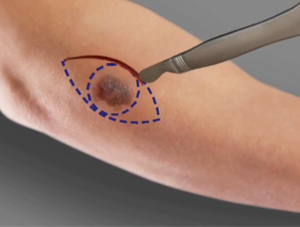
What is Skin Cancer?
The uncontrolled division of skin cells is called skin cancer. Skin cancer primarily occurs due to excessive exposure to ultraviolet radiation from the sun or repeated exposure to X-ray and chemicals. It can also rarely occur due to scars from certain diseases and burns.
What Tests are Used to Diagnose Skin Cancer?
Your doctor diagnoses skin cancer by conducting a skin biopsy, where a small sample of the suspicious tissue is removed to be examined under a microscope.
What are the Treatment Options for Skin Cancer?
Depending on the type and stage of skin cancer, your surgeon may recommend surgical excision, which involves the removal of entire cancer. In-office excision of skin cancer is performed under local anaesthesia. Your surgeon cuts out the cancerous area along with a surrounding margin of healthy tissue. The incision is then closed with stitches.
Large incisions require a skin graft or flap (skin from another location is removed and used to cover the defect) to close the wound. Your surgeon may recommend reconstructive surgery to preserve function and aesthetic appearance following the skin cancer removal.
As with any surgery, excisions of skin cancer may involve certain risks and complications which may include bleeding, pain, infection, scarring and risks of leaving residual cancer cells.






